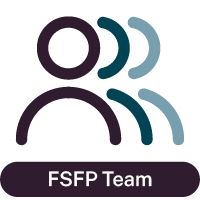In December 2015, information management veteran John Ladley and his staff at IMCue Solutions, an enterprise information management (EIM) consultancy firm in St. Louis, merged with First San Francisco Partners (FSFP). Since that time, John has been a member of our firm’s management team overseeing the delivery of our consulting services to clients and being one of the key faces of FSFP at industry events.
BECOMING A DATA PERSON
John’s roots in all things data begin in the late 1980s, long before his FSFP and IMCue days. The first role that sent him on his data management journey was when John became the director of methods and standards for a software company that worked with the Department of Defense. “Data was our product,” John remembered. “We kept their data, analyzed it and got paid by them to manage it. This is where I learned that managing data as a product can reap substantial rewards. The better we managed the data, the more we allowed it to be analyzed and accessible, and the more contracts we were awarded.”
In time, John became the firm’s Chief Information Officer with responsibilities over the data supply chain. But soon, “Peace broke out, and the Berlin wall came down,” he recalled, “and defense spending disappeared over night. Sadly, the little company I was working for was out of business in about five weeks.”
From that point on, though, John knew he was a data person.
John continued to work in data management roles, including a decision-support position (what we call business intelligence or BI today) at a top-five consultancy and a stint with an analytics firm where he oversaw BI and a data warehouse.
HE WROTE THE BOOK ON EIM (AND DATA GOVERNANCE)
John’s industry experience soon brought out the writer and “truth-seeker” in him, and he published books that are still well-known in the industry today: Making EIM Work for Business: A Guide to Understanding Information as an Asset and Data Governance: How to Design, Deploy and Sustain an Effective Data Governance Program.
When asked why he “wrote the books” on EIM and Data Governance (DG), John called his first one an “apology” to the industry for people being so bad at managing data. He said that no one talked about how to make it real and that it was all in the realm of tech. Since John had been on the business side, he felt he just knew how to talk about data.
“My second book about DG was written out of blind rage,” John said, “because the existing governance books were very deficient in how to make governance work. They were fine at theory and repeating scarce examples. But again, there was nothing concrete to help people!”
John went on to state a second reason for writing the DG book: His EIM book was too long, so he and his publisher were forced to cut out the governance section.

John Ladley “wrote the book(s)” on Enterprise Information Management and Data Governance.
FIRST IMPRESSIONS OF KELLE O’NEAL
After almost 20 years of working in data management, John founded IMCue in 2007. His firm offered BI, information management and DG consulting and focused on clients of varying sizes and industries, including health care and financial services.
Fast forward to 2013, where John remembered hearing a woman speak at an industry event. “She was young, intelligent and speaking quite eloquently about information management — and in a field populated by crusty, old gentleman like myself.”
After the conference session, John went up and introduced himself to the presenter (Kelle O’Neal, FSFP’s Founder and CEO) and congratulated her on her presentation. John and Kelle kept in touch and later decided to merge their companies in 2015.

A chance meeting at an industry event led to John Ladley and Kelle O’Neal working together at First San Francisco Partners.
A DAY IN THE LIFE AT FSFP
John is FSFP’s Chief Delivery Officer. When asked to describe his role in layman’s terms, he said his ultimate mission is to deliver FSFP’s solutions in a high-quality and consistent manner to clients and assigns the right resources for the right efforts.
Working with clients and meeting so many people at industry events, John has a good read on what’s keeping data management professionals up at night. “The number one thing I see,” John said, “is the light bulb is switched on and people finally understand they need to do something about data management. They know there is no longer a choice whether they can deal with it or ignore it. It’s now shifted to ‘How do I do data management?’”
John said companies are particularly focused on improving data quality and BI/analytics, becoming data-driven (and defining what that means for their company) — and data monetization, where they are packaging and marketing data either externally or using it internally to make their business more efficient.
DATA MANAGEMENT CAREER ADVICE
Being in the industry for almost 40 years, John has advice for people wanting to begin a career in data management. “The first thing to understand,” John said, “is that it’s not a technical pursuit, like a job doing coding. If you want to be a coder, that’s great, but you may not have the right wiring in your brain to be in data management. (That being said, I did come to data from coding.) Coders know data is important and they typically respect data management, but only to a degree. But what you need to be successful is to be an abstract thinker where you can visualize things. Then, this world is your oyster.”
“You have to be passionate and patient,” John added, “and stay current in the industry — and that takes a lot of work. That’s why I still attend conferences, not just to speak but occasionally just to be an attendee, like I did at the Gartner Data & Analytics Summit earlier in the year. Also, be sure to read everything you can, and keep your eyes and ears open to what’s happening. It’s easy to get behind and get stale, and your clients, leaders and peers will expect you to be current and creative. And if you don’t know about all the new tools in the toolbox, you won’t be the most creative.”
“If you’ve been in data management for a while and decide you want to be a consultant,” John went on to say, “just know you have to work really hard at it. You must be thoughtful solving problems and partnering with clients, and you’ll need a service mindset. You should have high standards for yourself and for ethical and appropriate behavior in the workplace. You can still have fun, though, and occasionally be goofy — which I’m known for.”
JOHN’S PASSION FOR FLYING
Outside his day job, John keeps busy with family and friends. He plays golf and rides horses with his wife, Pam, and enjoys music, too. “But number one on my list,” he shared, “is I’m an aviator. I like old airplanes, restoring and flying them.”
John took his first lesson on his thirtieth birthday. By age 31, he did his first solo flight. “Then, over the years,” he shared, “I scratched, clawed, saved up and sometimes went without to continue flying.”
“There’s nothing that speaks to my soul more — or is more spiritual to me — than being in an open cockpit airplane on a warm summer day, where I can smell the grass, see the animals and feel the atmosphere. I truly love flying,” John said.
John is a flight instructor on the weekends and flies at least once a week, weather permitting. Soon, he’ll become certified to teach others to fly multi-engine (two, three or four) planes — and he also plans to qualify to become a trainer for other flight instructors.

John Ladley’s passion for flying has taken him from his first solo flight more than 30 years ago to training other people to fly.
DATA MANAGEMENT TAKES FLIGHT
It isn’t hard for John to find a correlation between data management’s very grounded work to the stratospheric role of a pilot. “Every pilot gets the point of soloing,” John shared. “To get someone to that point, they have to be able to take each thing they learned in training and then piece things back together. If they’re coming back to the airport and need to descend, they must remember how to do this and do that one thing very well. When they get the inevitable curve ball thrown at them, like the wind changing directions, they must remember the correlation between the wind and the rules they learned during training — and then navigate around the airport.”
John added that, just like learning to fly, people who work in DG and master data management first learn the skills they’ll need and then grow their knowledge as the years go by. He said there are building blocks and best practices in data management that one learns and later uses to help move through challenging situations.
Thinking back on the many data management conference sessions John led, he said, “It’s rewarding to know I played a small part in people’s career growth. I get the same kick from being a flight instructor and feel lucky I’ve been able to balance these dual passions throughout my life.”


